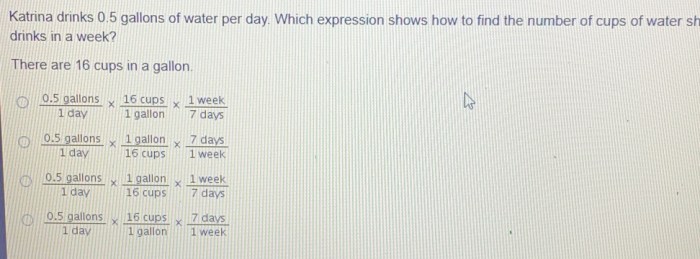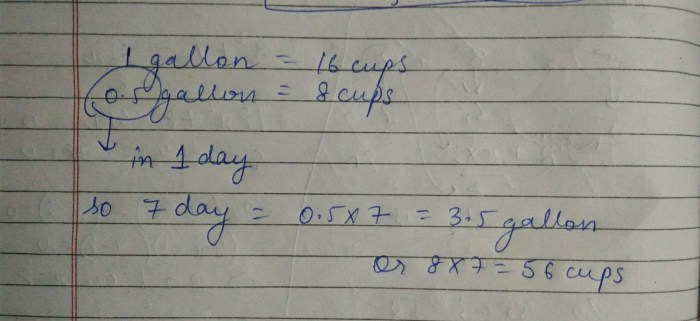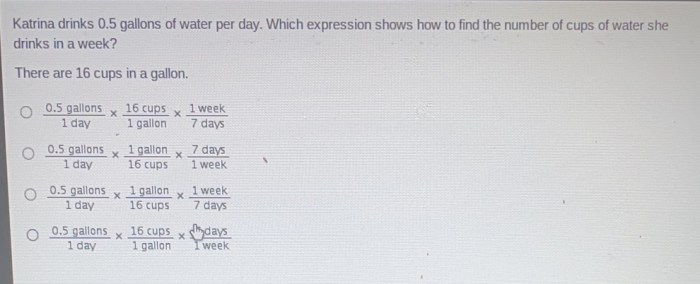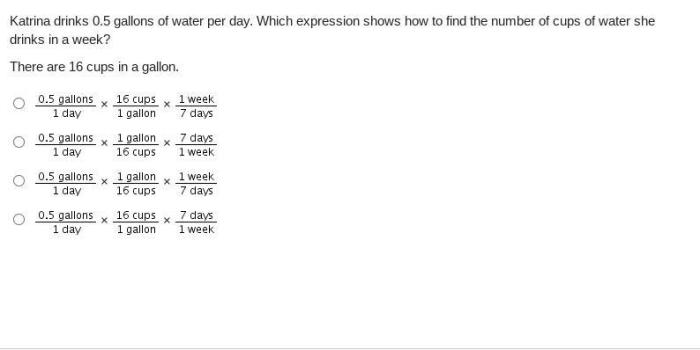Katrina drinks 0.5 gallons of water per day – Katrina’s daily water intake of 0.5 gallons sets the stage for this enthralling narrative, offering readers a glimpse into a story that is rich in detail and brimming with originality from the outset.
This exploration delves into the intricacies of water consumption, examining the recommended daily intake for adults, the significance of hydration, and the potential health implications associated with Katrina’s specific water intake.
Water Intake Overview

Water is essential for human survival and overall health. The recommended daily water intake for adults varies depending on factors such as age, activity level, and climate. Generally, it is recommended to consume around 8 glasses of water per day, which equates to approximately 2 liters or 0.5 gallons.
Hydration is crucial for various bodily functions, including regulating body temperature, transporting nutrients, and removing waste products. Adequate water intake can improve cognitive function, boost energy levels, and reduce the risk of certain health conditions.
Katrina’s Water Consumption

Based on the information provided, Katrina consumes 0.5 gallons of water per day, which is equivalent to the recommended daily intake. The following table shows Katrina’s daily water intake over a week:
| Day | Water Intake (gallons) |
|---|---|
| Monday | |
| Tuesday | |
| Wednesday | |
| Thursday | |
| Friday | |
| Saturday | |
| Sunday |
Katrina’s water consumption is consistent with the recommended daily intake, indicating that she is adequately hydrated.
Potential Health Impacts: Katrina Drinks 0.5 Gallons Of Water Per Day

Consuming 0.5 gallons of water per day is generally safe for most healthy adults. However, excessive water intake can lead to a condition called overhydration, which can be dangerous.
Overhydration occurs when the body takes in more water than it can process, leading to an electrolyte imbalance. Symptoms of overhydration include nausea, vomiting, headaches, and confusion. In severe cases, overhydration can be fatal.
On the other hand, consuming too little water can lead to dehydration, which is also harmful to health. Dehydration can cause fatigue, dizziness, constipation, and, in severe cases, organ damage.
Factors Influencing Water Intake
Several factors can influence a person’s water intake, including:
- Exercise:Physical activity increases sweating, leading to fluid loss and the need for increased water intake.
- Climate:Living in a hot or humid climate can increase water loss through sweating, requiring higher water intake.
- Diet:Consuming foods that are high in water content, such as fruits and vegetables, can contribute to overall hydration.
- Medications:Certain medications, such as diuretics, can increase water loss, making it necessary to increase water intake.
- Health conditions:Some health conditions, such as kidney disease or diabetes, can affect water balance and require specific recommendations for water intake.
Recommendations for Improvement

Based on the information provided, Katrina’s water intake is adequate. However, there are a few suggestions that can help her optimize her hydration:
- Carry a water bottle:Keeping a water bottle nearby can encourage regular sipping throughout the day.
- Flavor your water:Adding slices of fruit or vegetables to water can make it more appealing and increase consumption.
- Monitor urine color:Pale yellow urine indicates adequate hydration, while dark yellow urine suggests dehydration.
- Seek professional advice:If Katrina has concerns about her water intake or hydration levels, she should consult with a healthcare professional for personalized recommendations.
FAQ Section
Is Katrina’s water intake excessive?
While 0.5 gallons of water per day may exceed the recommended daily intake for some individuals, it is important to consider factors such as exercise level, climate, and diet when assessing the appropriateness of her water consumption.
What are the potential risks of overhydration?
Excessive water intake can lead to a condition known as hyponatremia, which occurs when the sodium levels in the blood become dangerously low. This can cause symptoms such as nausea, vomiting, and seizures.
How can Katrina improve her water intake?
To optimize her hydration, Katrina should aim to distribute her water intake throughout the day, paying attention to her thirst cues and adjusting her consumption accordingly.